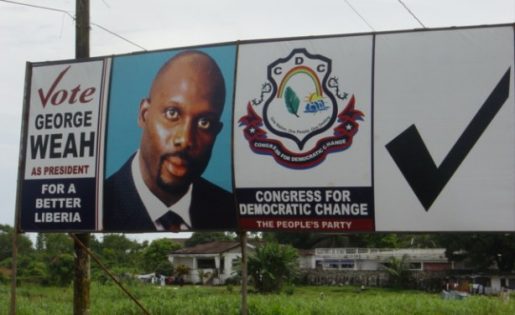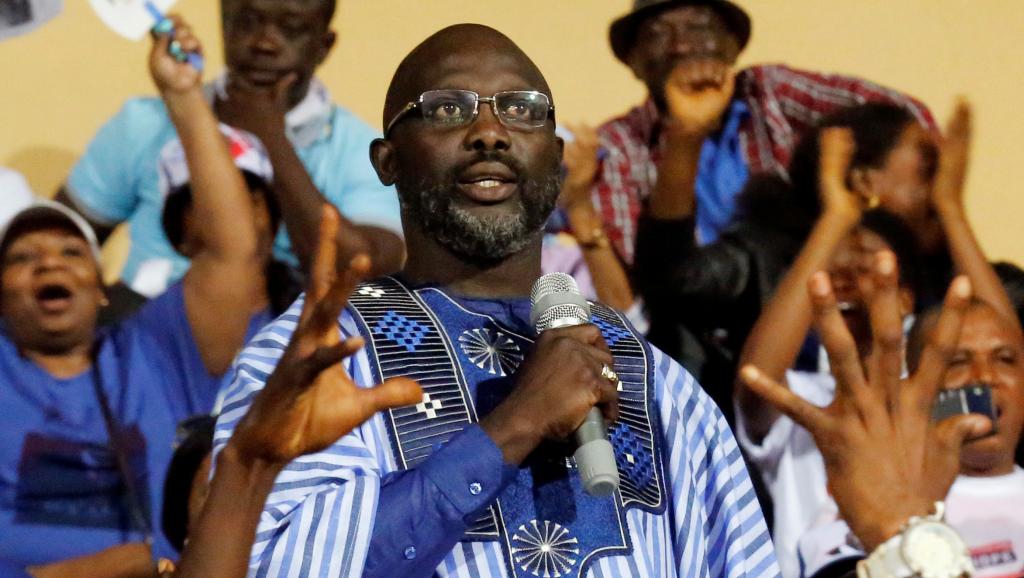Liberians return to the polls on Boxing Day to vote in the presidential run-off between incumbent vice president Joseph Boakai and retired footballer George Weah.
The wait for the second round has been long and feverish following a legal tussle between one of the 20 candidates from the first round who challenged the results on the grounds of frauds.
However, the Supreme Court threw out his complaints to pave way for the run-off, seven weeks after the first round from which Weah emerged as winner with 39.0% of the vote followed by Boakai, who raked 29.1%. Both fell short of the 51% required for an outright victory.
The winner of Tuesday’s run-off will succeed Africa’s first elected female president Ellen Johnson Sirleaf who has ruled the West African nation for 12 years.

Weah, a three-time African Footballer of the Year, is on the verge of realising his ‘hugest’ dream after coming close in a similar run-off in 2005 and losing to Sirleaf.
At his final campaign rally in Monrovia on Saturday December 23, the 51-year-old former AC Milan and PSG striker re-echoed his promises to build roads, create jobs for the youth and fight corruption in one of Africa’s oldest nations of four million people.
His campaign, which is largely focused on the realities of low-class Liberians, appeared to have gained traction amongst this group, which make up about 65% per cent of the entire population.
“It is a do or die affair for Weah right now. This is his time, his moment. If he doesn’t get it this time then he would never again,” Theodore Jebor, a Monrovia-based micro-finance expert told ACLsports.com.
“He has never been so close and so favoured by the socio-politico environment. Liberians are aspiring for a change, a fresh air and that could be Weah. His rival, Boakai, has been in the presidency for 12 years. Giving him the chance to rule again would mean the same thing,” he said.
Boakai and Sirleaf moved the country from the aftermath of more than a decade of civil wars that claimed more than half a million people and displaced more than a million.
The pair also championed the successful fight against the Ebola epidemic that resulted in the death of 4,800 people between 2014 and 2015.
However, observers say the country’s general administration remains corrupt, with poor social amenities and high unemployment rate.
“Liberia has come a long way and normalcy has totally been restored, but the progress the youths are yearning for is not in sight, due to corruption and lack of vision from the ruling elites,” Malik Conneh, a law lecturer at the University of Liberia, Monrovia, told ACLsports.
“However, we are not still sure if George Weah or Boakai would be the man of the situation. What we are seeing is some kind of blind hope and faith. Until we get there we can’t really tell if any of the two aspirants would take us to the promise land.”
Weah is widely seen as the ‘ghetto boy’, who has tasted poverty and knows how deep it bites. Whereas Boakai enjoys an elitist status, and many locals describe him as too old at 73, and out-of-touch with the sufferings of the ordinary Liberian.
But, his supporters maintain that he has more experience, better education and enough foreign contacts to put the country in the right direction.
“George Weah is not educated. He can hardly speak good English. He can hardly defend his political agenda. We cannot vote a candidate based on passion and popularity. We need a competent hand to rule a complicated country like Liberia, and not a man who would draw us back. We have suffered too much,” said Ibrahim Kamara, who voted for Boakai in the first round.
Weah faced such criticisms throughout the campaigns. Although, after retiring from football in 2003 he attended DeVry University in the United States many in Liberia still see him as uneducated.
His supporters argue that a ‘rocket science’ degree is not needed to govern a nation, but the ‘willingness’ to listen to the populace and cater for their needs.
“Sirleaf and Boakai that boast of high degrees, what did they do for Liberia? Nothing! Absolutely nothing!! We need a candidate that feels our pains and looks like us,” Keita Francis, a Weah supporter said. “They say he is not educated but how manage he emerged winner of the first round, beating all the educated heads? It means people love and want him, simple.”
Weah currently has as running mate Jewel Howard Taylor, former wife of Charles Taylor, an ex warlord who ruled Liberia between 1997 and 2003 but now serving a 50-year sentence in a British prison after being convicted by the Sierra Leone War Crimes Tribunal.
Could that be a problem for the 1995 Ballon d’Or winner on Tuesday?
“I don’t think so. I see it rather as a boost, an advantage. Mr Taylor is still popular in the country, despite his situation and I feel some voters could connect to Weah through Taylor’s former wife,” Singleton Tweh, a Moronvia-based Biologist said.
By Wednesday morning, Liberians will have a new leader and if it happens to be Weah he would have achieved his goal despite the many odds, like he puts it in his final campaign words:
“Football taught me how to work hard and how to crush obstacles in order to succeed and that has been my philosophy, which I would be taking to the presidency to help this nation surmount the difficulties it currently faces.”














